Nil Bid: In this commonly played variation, a player on his turn to bid, can declare a bid of
nil. A nil bid indicates the player intends to win no tricks on the hand. The other players (opposing players as well as the players partner) declare their bids as normal (even declaring nil themselves, if appropriate).
If a nil bid is successful (indicating that the player who declared the nil bid won no tricks in the hand) the partnership scores 100 points. Any score the partner wins (or loses) on the hand are also
totaled as normal on the hand.
However, if the player who bid nil wins one or more tricks, the partnership loses 100 points instead. Any additional score won or lost by the players partner on the hand will also combine with this for purposes of determining if the partnership as a whole was able to achieve their contract for the hand. If both players in a partnership bid Nil, this is called a
double nil bid. In this instance, each player in the partnership would earn the 100 point bonus or -100 point penalty as appropriate which would be applied to the partnerships current score.
Blind Bid: This optional rule allows a player to make a blind bid. When making a blind bid a player does not yet pick up or look at his hand after the deal. Instead, he makes his bid with no knowledge of what cards might be found in his hand. The maximum number of tricks a player may bid blind is generally capped at 7. If a player bidding blind, himself wins exactly as many tricks as bid, his partnership earns a bonus of 100 points. If he wins more tricks than bid no bonus points are awarded (although no points are lost either) but the extra tricks can be counted towards the partners necessary tricks. However if the partner also scored more these tricks would be counted as bags. If he wins less tricks than his blind bid, however, his partnership loses 100 points. This score would be in addition to any score from his partners bid.
Blind Nil Bid: This version is similar to the nil bid, however the player must make this nil bid before looking at any of his cards dealt for the hand. If the player does not take any tricks during the hand their partnership score 200 points. However if the player making the blind nil bid takes any tricks the partnership loses 200 points instead. As in the standard nil bid any score won or lost by the nil Bidding players partner will still combine with tricks taken to determine if the partnership made their total bid for the hand. This variation is often played along with the standard nil bid, as detailed above. If both players in the same partnership opt for a bid of Blind Nil, this is called a
double blind nil bid. In this case, each player would earn the 200 point bonus or -200 point penalty for his partnership as appropriate.
Blind Nil with Exchange: This version is exactly the same as Blind Nil, above, however after making a bid of blind nil and looking at his cards, the player may exchange individual cards from his hand with his partner. The most common variation is to allow a one card exchange, however two or even three card exchanges are allowed in some games. Neither player in the exchange may look at the card(s) received until they have passed their own cards for the exchange, face down, to their partner.
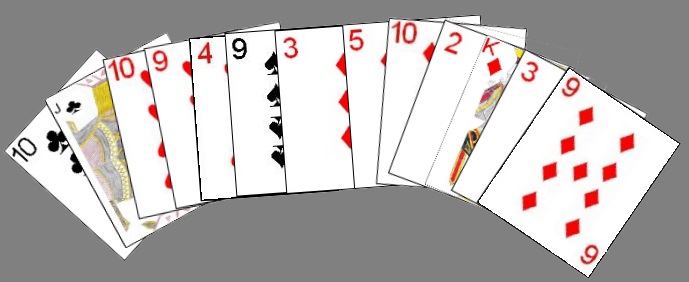 Deficient Hands
Deficient Hands: Some Spades players use the deficient hand rule. When using this rule, a player who believes his hand is "deficient" can, before he or his partner has begun bidding, make this declaration. To do this, the player must place his entire hand face up on the table so all players can verify the hand to be deficient. Different groups of players consider different types of hands to be deficient. The following are some of the common categories of what might be called a deficient hand:
- A hand containing no cards of the spade suit
- A hand containing only one card of the spade suit
- A hand containing no face cards
The players must all agree before the game what specific conditions constitute a deficient hand. No player is required to declare a deficient hand even if his hand qualifies for that distinguishment. When a player legally declares a deficient hand, the hand is dead, being considered a misdeal. Thus, the cards are all thrown in, reshuffled and the next player in turn deals. No scoring occurs on the dead hand.
Four or None: This version, which also goes by a number of other names, consists of a tricky variation on the bidding. When this variant is played, one member of each partnership must bid Nil (a bid to win no tricks) and the other must make a bid of four or more. No other bid combinations are permissible. The player bidding Nil attempts to win no tricks during the hand. If they succeed in doing this, they win 100 points for the partnership in addition to any successful bids by the partner. If the Nil bid player wins any tricks, the partnership must subtract 100 points from their accumulated score. In that case they may still be able to win any successful bid made by their partner.
Partnership Fourteen: This is another Spades version which varies solely on how the bidding is done. In this variant, each partnership must bid in such a manner that the total bids for each partnership must equal exactly 7 (for a total of 14 tricks bid at the table for the hand). Thus, if the first bidder in a partnership makes a bid of 4, his partner must then bid 3 to bring the total to exactly 7. No player may bid less than two. In all other respects this version is played identically to standard Spades.
Mirror: Another variation sometimes seen is called Mirror bidding. In this variant, each player must bid the exact number of cards of the spades suit they have in their hand. A player having no such spades in their hand must bid Nil. Once the bidding is completed, the game itself is played identically to standard Spades.
Low Club Lead: When this optional rule is played the player who holds the lowest club (in most versions of Spades, the 2 ♣) leads the first trick, leading that card. The turn to play to the trick then continues in a clockwise rotation from this player. As in the other versions of Spades, the winner of each trick leads the first card to the next trick.
10 for 200: This is another optional bid that some players allow during the hand. When making this bid, the bidder is obligating his team to win a minimum of 10 tricks. If successful, the partnership earns 200 points and if the team wins 9 or less tricks during the hand they must subtract 200 points from their score instead. Any tricks won during this bid in excess of 10 are still considered bags for the team winning them. This bid is also sometimes known by the names Wheels or Bidding a Flight.
Boston: A Boston is an optional rule some players prefer to add to the game. When using this rule a team who bids to win every trick and manages to do so instantly wins the game, regardless of their own or opponents current score. A partnership may never bid Double Nil after the opposing partnership has bid a Boston and similarly a Boston bid is never allowed after a bid of Double Nil. A Boston bid is also often called Shooting the Moon or a Slam.
Little Moe: This is a bid to win six successive tricks. Thus, in order to be credited with winning a Little Moe, the partnership must win six tricks consecutively. If the partnership makes this bid and is able to do so, they win 150 points. Any bags earned during a successful Little Moe bid are not counted for the team making the bid.
Big Moe: A Big Moe is similar to a Little Moe in that it is a bid and attempt by the partnership to win a certain number of tricks consecutively. Thus, in order to have a successful Big Moe attempt, a partnership must win 8 successive tricks. If a member of a partnership makes this bid and is able to do so, they win 300 points. Any bags earned during a Big Moe bid are not counted for the team making the bid.
Bemo Bids: Very similar to the Moe bids are the Bemo bids (Bemo being a shorthand version of saying Big Moe). Similar to a Big Moe bid, a Bemo bid is a special bid that a player can supplement his normal bid with. To be successful, if the high bid ends up being such a bemo bid, that partnership must win the first 6 tricks of the hand in addition to winning the number of tricks declared in the bid itself. The Bemo bid is thus made in addition to a player's regular bid. If a player manages to fulfill the Bemo bid he wins the appropriate score as per his bid as well as a bonus of 60 points. If the bid is unsuccessful, the partnership must subtract 60 points in addition to any other penalty scores for not making the base bid.
In addition to a standard Bemo bid, a player may opt to supplement his normal bid with a Big Bemo bid. A big bemo bid is a bid to win the first 9 consecutive tricks of the deal. If succeessful, the player earns a bonus of 90 points in addition to the normal score for fulfilling his normal bid. If unsuccessful, the player is assessed a penalty of 90 points in addition to any penalty for failing to fulfill the base bid.
No Spade Trumps: When using this optional bidding rule a player may add the extension "No Trump" to a bid of one or more. A player adding this extension to their bid is still stating an intention to win the number of tricks bid. However, they may not win any trick using a card of the suit of Spades. This bid may only be made by a player who has at least one spade in their hands and the partner of the player making this bid must agree to allow their partner to make the bid. A player who successfully makes a bid with the "No Trump" earns double the number of points for each trick (40 points)
No Bags: Some players prefer to play a variation in which Bags (overtricks) are not scored or tracked. As such, a partnership would not receive any points for overtricks, but would also not score any penalties when collecting 10 bags. This rule drastically changes the bidding and play of the hand.
TRAM: In games comprised of experienced players, another optional rule that is sometimes used is called TRAMing. TRAM is an acronym for "The Rest Are Mine" and is a declaration that a player makes when he is certain that he is sure to win the remainder of the tricks in the hand. To do this, he would lay down his hand and would then demonstrate how we would win the remainder of the tricks regardless of cards held by the other players. This rule can be used to help speed up the play, with the player making a successful TRAM declaration awarded the remainder of the tricks as declared.
However, if a player declares TRAM and it can be shown that he would not in fact win all remaining tricks in the hand, he is penalized in some manner. The usual options that can be selected are as follows; to force the TRAMing player to play the remainder of the hand with his cards exposed, to forfeit the remainder of the tricks or forfeiting his bid on the hand.
Face Up Deals: Another variant sometimes played to add some spice to the game is for the dealer to elect to deal a certain number of each player's cards face-up. When using this rule, the dealer may elect to deal up to four cards for each player face-up. The same number of cards must be dealt face up for each player. Although part of each player's hand, these cards should remain face-up on the table in front of the player until he elects to legally play it to a trick. When a face-up deal is being played, a player may still make a Blind Nil bid as long as no other cards from his hand have been exposed to the player.
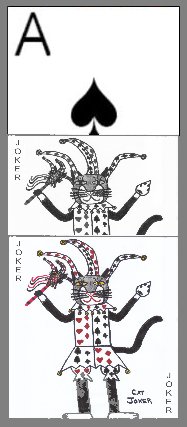 Joker Spades
Joker Spades: In this very popular variant of Spades (also sometimes called "Joker, Joker, Ace", Jokers High, Jokers Wild, or Easy Spades), two Jokers are added to the deck, making a 54 card deck. The Jokers should be distinguishable from each other but have the same back design as the rest of the cards in the deck (usually one color Joker and one black and white Joker). In this case, the Jokers are considered to be part of the Spade suit, with the ranking of the Spade suit as follows: Color Joker (called
the Big Joker), Black and White Joker (called the Little Joker), Ace ♠, King ♠, Queen ♠, Jack ♠, 10 ♠, 9 ♠, 8 ♠, 7 ♠, 6 ♠, 5 ♠, 4 ♠, 3 ♠, 2 ♠. The other three suits retain their normal ranking.
Since, with the addition of the two Jokers, the cards will not deal out evenly, there are a few different methods of dealing with the extra cards.
The first method, which is the more common such method, is to remove two other cards from the deck leaving a 52 card deck. Different cards can be selected for removal, but often the cards removed are the two of clubs and the two of diamonds. The cards removed should be set aside and out of play.
A second method sometimes uses is to retain the entire deck of 54 cards. The hands are dealt as normally, with each player receiving 13 total cards. Since there will be two cards left over after each player is dealt their hand, the dealer takes the last two remaining cards into his hand at the completion of the deal. After then examining his hand, the dealer than discards any two cards from his hand which are set aside, out of play, for the remainder of that hand.
In all other respects Joker Spades is played identically to the standard game of Spades as described above.
Joker, Joker, Deuce: Similar to Joker Spades, is a variant usually simply known as Joker, Joker, Deuce. This (and other similar) variants gets it's name from the ranking of the top few cards in the spades suit. As with Joker Spades, two Jokers are added to the deck for play, one (usually the Color Joker) set as the Big Joker, and the other (usually the black and white Joker), the Little Joker. To compensate for the additional cards, two low cards (such as the two of clubs and the two of diamonds) are removed from the deck. Thus the ranking of the cards in the suit of spades is as follows: Big joker, Little Joker, 2, Ace, King, Queen, Jack, 10, 9, 8, 7, 6, 5, 4, 3. Other than this addition of the Jokers and the modified ranking, this version is otherwise played identically to the standard variant of Spades as described above.
Joker, Joker, Deuce, Deuce: This is another Spades variant in which the Spades trump suit is enhanced. First, two Jokers are added to the deck, and are considered the two highest cards in the suit of spades. The
color Joker (full color Joker) is usually set as the Big Joker, and the black and white Joker (or one-color Joker) is set as the Little Joker. To still allow the cards in the deck to be dealt evenly amongst the four players, two low cards are removes (such as the two of clubs and the two of hearts). In addition, in this variant, the two of hearts is considered the third highest card in the suit of spades. It must thus be rememberd, that the two Jokers and the two of diamonds are considred part of the suit of spades and would thus be played any time a card in the suit of spades should or would be played. The ranking of the cards in the suit of spades is as follows (from high to low): Big Joker, Little Joker, two of diamonds (
♦), two of spades (♠), Ace (♠), King (♠), Queen (♠), Jack (♠), 10 (♠), 9, 8, 7, 6, 5, 4, 3. The other suits rank in the standard order, with the exception of the suit of diamonds and clubs which do not have a card in the rank of deuce (the two of clubs was removed and the two of dimaonds is set as a member of the trump suit, spades).
Spades for Three Players: A common variation of Spades for three players is often played. In three player Spades, there are no partnerships with each player playing strictly for himself.
Determination of the first dealer and seating positions can be done in the standard way. After this determination is made, the dealer, starting with the player to his left deals the cards face down, one by one, around the table until each player receives 17 total cards. There will be one extra card which is set aside, face down and not used for the hand.
Then, each player, starting again with the player to the dealers left, makes one bid, with the intent to win that many tricks during the hand. Once every player has made their bid, play begins.
Whichever player holds the two of clubs must lead it to begin the first trick. If the two of clubs happens to be the discarded card, the player with the 3 of clubs must lead that card instead. As in the four player version, the remaining players in turn each then play a card to the trick. A player must play a card of the suit led to the trick if they have one. If they do not have such a card, they may play any card to the trick, including a spade. The highest spade played to the trick wins it. If no spade was played to the trick, the highest card of the suit led to the trick wins the trick. A player may never lead a spade to a trick until a spade has already been used to win a trick (in which a non spade card was led to the trick). However, if all of a players remaining cards are spades he may play any card.
If a player manages to win at least as many tricks as he bid, he earns 10 points for each trick bid. If the player wins fewer tricks, he loses 10 points for each trick bid. For each trick a player wins over their bid (called an overtrick or bag) he loses 10 points. The first player to accumulate, over any number of hands, 500 total points at the end of a hand wins the game. If two or more players reach or exceed this total at the end of a hand, the player with the highest total count is considered the winner of the game.
Two Player Spades: There is also a two player version of Spades that is commonly played. The shuffle and determination of seating positions can be performed as in any standard two player card game. However, in two player Spades, there is no actual deal. Instead, the shuffled deck is set face down in a neat stack between the two players and each will draw cards to form their hand.
One of the players should be selected as the first player. This can be done by a previous draw of high cards or any other agreed upon method. This player will draw the first card, make the first bid and lead to the first trick in the hand.
Once such a player is selected, this first player will draw the top card of the stack such that his opponent cannot see the face of the card.
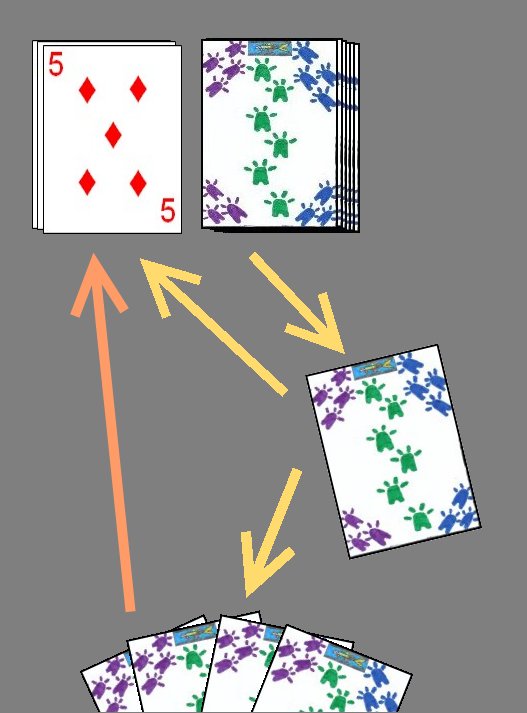
If the player wants to keep the card drawn, he adds it to his hand. He would then pick up the next card and immediately discard it face down next to the stock pile where both players can see its face.
However, if the player decides he does not want the card drawn, he discards it next to the stock, face up, and adds the next card of the stock to his hand, ensuring his opponent cannot see its face. The opposing player than performs the same task, taking either the first or second card from the stock. This process continues alternating between the two opponents until the stock is depleted and each player should have a hand consisting of 13 cards.
Starting with the first player, each player makes one bid declaring the number of tricks he expects to win during the hand. Bids of Nil are allowed, indicating an intention to win no tricks during the hand. A bid of Double Nil is also allowed but this bid must be made before either player draws their first card from the stock. After making a bid of Double Nil a player may not change their bid for that hand. A player who does bid Double Nil, after the drawing has completed may, at his discretion, discard three cards face down and draw three cards randomly from the discard pile.
Once both players have made their bid, the first player then leads the first card to the first trick. This player may not lead a spade unless they have no other cards in their hand but may lead a card of any other suit. The opponent then must play a card of the same suit to the trick. However, if the player has no cards of that suit, they may play any card from their hand, including a Spade. The highest Spade played to each trick wins it, and if no spades have been played to the trick the highest card of the suit led wins the trick. A player may never lead a spade to a trick unless he either has no other suit to play or a spade has previously been played to a trick during this hand. Each player gathers the tricks he has won face down in front of himself to help track if he has made his bid at the end of the hand. Once all 13 tricks have been played, the players determine if they were able to obtain their bid.
A player able to make or exceed his bid earns 10 points per trick bid. However, a player unable to make their bid loses 10 points per trick bid. A player also earns 1 point for each trick won in excess of their bid (called a bag). Each time a player accumulates 10 bags they must subtract 100 points from their total score. This can occur as many times as a player accumulates 10 bags over the course of one or more deals. A player who makes a Nil bid and wins no tricks earns 100 points for the feat. However, if a player makes a Nil bid and wins one or more tricks they instead lose 100 points. If a player bid Double Nil and wins no tricks during the hand, they win 200 points. However, if they win one or more tricks they lose 100 points. As in other bids, each overtrick won in Nil and Double Nil bids earns one point but counts towards the bag accumulation for that player.
At the end of each hand, the first players opponent would draw the first card, make the first bid and lead to the first trick. This privilege alternates between both players until a player is able to accumulate 500 or more total points at the end of a hand. The first player to do this is declared the winner of the game. If both players manage this at the end of a hand, the player with the higher total is the winner.
Crazy Spades: Crazy or Progressive Spades is an exciting variant with some aspect of the rules changing each hand. The game is usually played over a number of hands, with each deal having some difference from any other hand, often in the bidding requirements for that hand. The specific order and requirements for each hand vary greatly from place to place, but the following gives a potential set of requirements over 15 hands:
- Regular - This hand is played using the regular Spades bidding and play rules.
- Four or None - During this hand, the bidding variation Four or None is played. Thus, one member of each partnership must bid Nil and the other must bid four or more.
- Bags for All - For this hand, each player must make a bid of exactly one.
- Mirror - During this hand each player must bid as per the Mirror bidding rule (A player must bid exactly the number of spades they have in their hand).
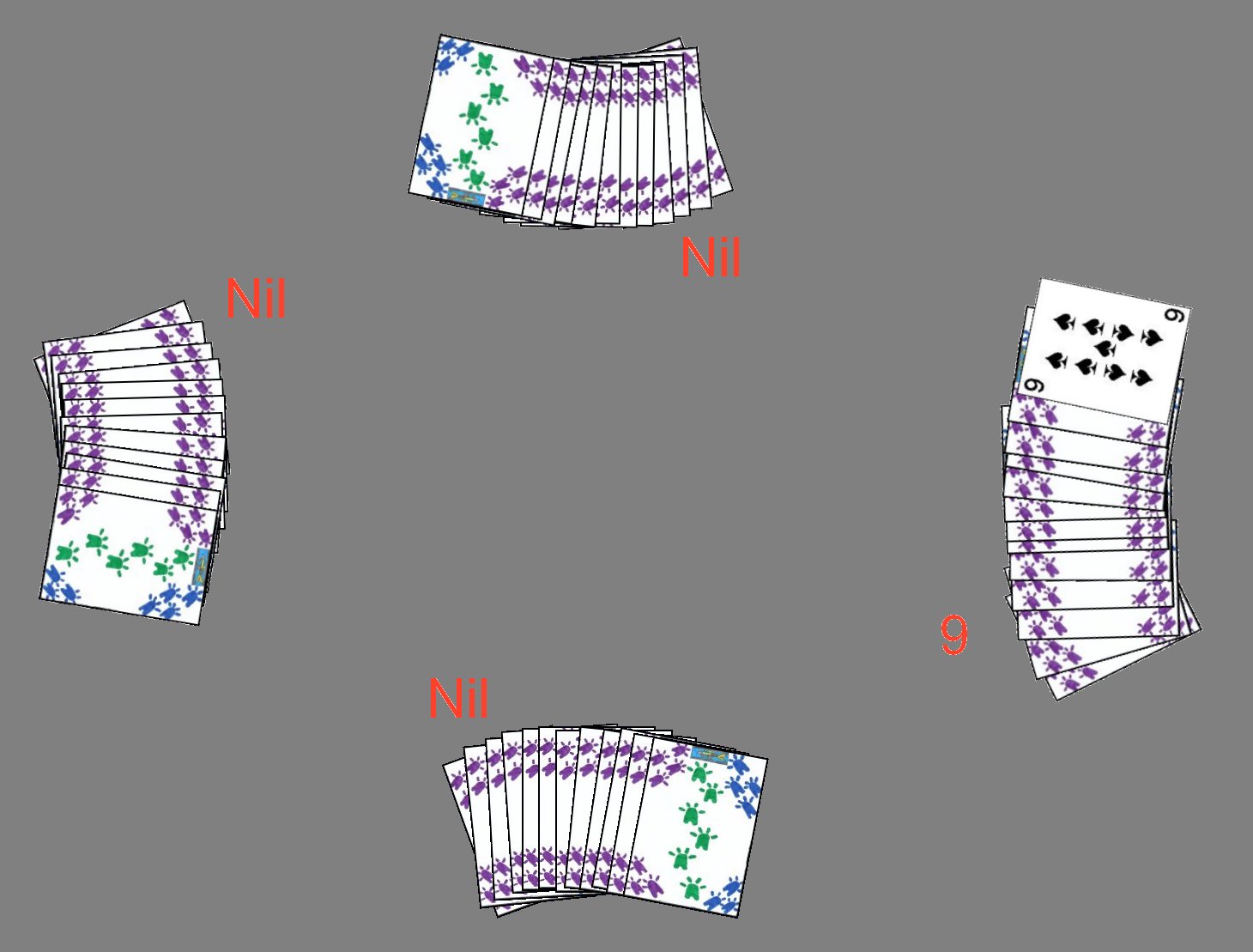
- The Pressure is On - The bidding is normal, however the play of the hand is changed. In this version, if a player does not have any cards of the original suit led, they must trump regardless if they intend to win the trick. If he has no cards of the spades suit he may play any card to the trick.
- Clubs Mirror - A players bid during this hand must be exactly the same as the number of clubs they have in their hand.
- Partnership Fourteen - During this hand, each partnership must adhere to the Partnership Fourteen method of bidding. Thus, the total tricks bid per partnership must exactly equal seven.
- Hearts Mirror - During this hand, a player is required to bid the exact number of Hearts they contain in their hand.
- All Nil - All players must bid Nil during this hand.
- Diamonds Mirror - A player must bid the exact number of Diamonds they have in their hand.
- All Around Blind - No player may look at their cards until the bidding has completed. Thus, all players must bid blind during this hand.
- Partnership Mirror - Both partners must bid the same number of tricks. Thus, the second partner is required to mirror the bid made by the first partner. The partners may not consult on their bid before or during the bidding.
- Crazy - Everyone bids nil except the player who has the 9 of Spades, who must bid nine.
- Nothing but Spades - Regular bidding, however no player can play a Spade until they have nothing but Spades in their hand.
- Royalty - Each player must bid one for each Ace, King, Queen or Jack in their hand. If a player has no such cards, they must bid Nil.
Since many of the hands require a player to bid a specific number regardless of his hand, this is not considered a blind bid for determination of scoring penalties or bonuses unless the round actually requires the player to make a blind bid. Other than the changes indicated for each hand, all other rules are as in standard Spades. At the end of the 15 hands, whichever partnership has the highest total score is declared the winner.
Copyright © 2015 CatsAtCards.com. All rights reserved.
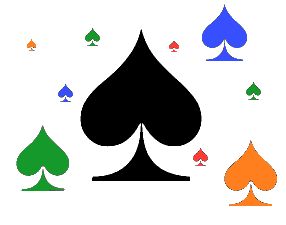
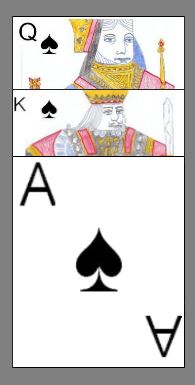
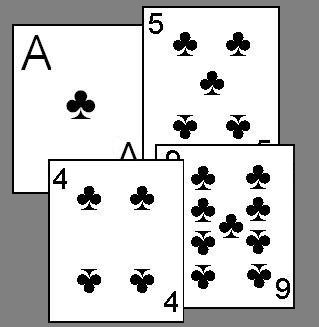
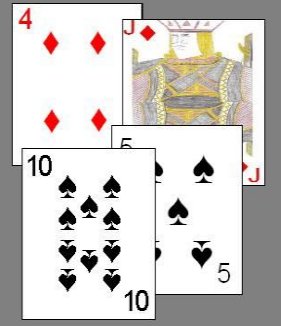
 Bags: While each overtrick won in the hand scores one point, these extra tricks can also penalize a partnership for gathering too many. As soon as you get a total of 10 bags (over the course of one or more hands), that partnership must subtract 100 points from their total score. Again, negative scores are possible. Once this total of 10 bags is reached, any excess bags are counted toward the next 10 which will again subtract another 100 points if reached, and so on. Thus, for each 10 overtricks the partnership takes in beyond those necessary for their contract, subtract 100 points from the partnerships score.
Bags: While each overtrick won in the hand scores one point, these extra tricks can also penalize a partnership for gathering too many. As soon as you get a total of 10 bags (over the course of one or more hands), that partnership must subtract 100 points from their total score. Again, negative scores are possible. Once this total of 10 bags is reached, any excess bags are counted toward the next 10 which will again subtract another 100 points if reached, and so on. Thus, for each 10 overtricks the partnership takes in beyond those necessary for their contract, subtract 100 points from the partnerships score.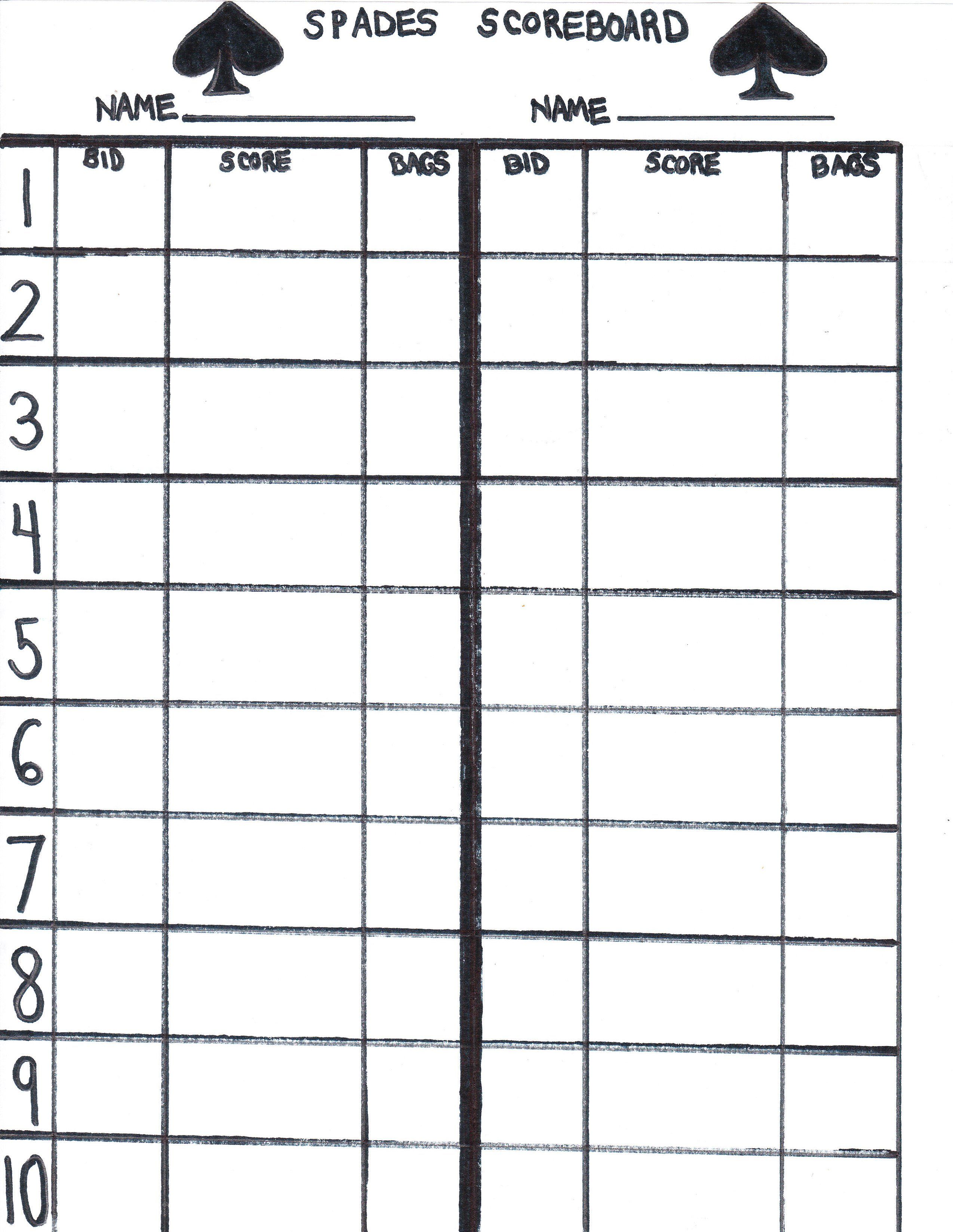
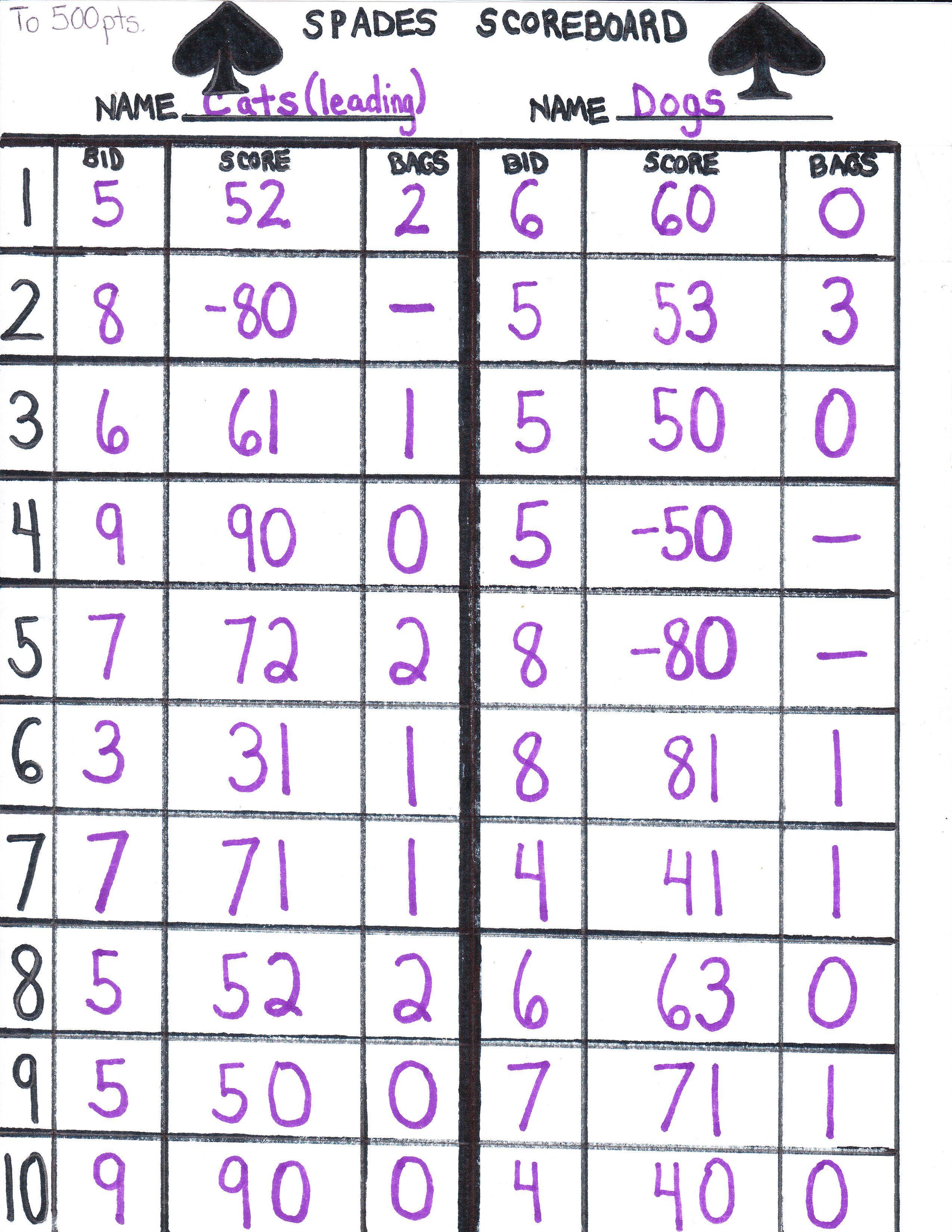
 Deficient Hands: Some Spades players use the deficient hand rule. When using this rule, a player who believes his hand is "deficient" can, before he or his partner has begun bidding, make this declaration. To do this, the player must place his entire hand face up on the table so all players can verify the hand to be deficient. Different groups of players consider different types of hands to be deficient. The following are some of the common categories of what might be called a deficient hand:
Deficient Hands: Some Spades players use the deficient hand rule. When using this rule, a player who believes his hand is "deficient" can, before he or his partner has begun bidding, make this declaration. To do this, the player must place his entire hand face up on the table so all players can verify the hand to be deficient. Different groups of players consider different types of hands to be deficient. The following are some of the common categories of what might be called a deficient hand:

 If the player wants to keep the card drawn, he adds it to his hand. He would then pick up the next card and immediately discard it face down next to the stock pile where both players can see its face.
However, if the player decides he does not want the card drawn, he discards it next to the stock, face up, and adds the next card of the stock to his hand, ensuring his opponent cannot see its face. The opposing player than performs the same task, taking either the first or second card from the stock. This process continues alternating between the two opponents until the stock is depleted and each player should have a hand consisting of 13 cards.
If the player wants to keep the card drawn, he adds it to his hand. He would then pick up the next card and immediately discard it face down next to the stock pile where both players can see its face.
However, if the player decides he does not want the card drawn, he discards it next to the stock, face up, and adds the next card of the stock to his hand, ensuring his opponent cannot see its face. The opposing player than performs the same task, taking either the first or second card from the stock. This process continues alternating between the two opponents until the stock is depleted and each player should have a hand consisting of 13 cards.
